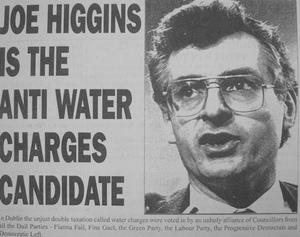Opposition to housing charge echoes previous campaigns

Plans by the Socialist Party and the Workers Solidarity Movement to resist the introduction of the new household charge are reminiscent of previous campaigns, in particular the Federation of Dublin Anti-Water Charge Campaigns during the early 1990s, which successfully campaigned against a household water charge in Dublin. By Bernard O'Rourke.
The Socialist Party has called on householders to refuse to pay the new annual household charge announced by the government this week.
On Tuesday (26 July) the Minister for the Environment Phil Hogan unveiled measures which will see a €100 annual 'household charge' come into force from January 2012. He also confirmed the establishment of a new company, Irish Water, to oversee the installation of meters in all domestic dwellings ahead of the introduction of domestic water charges based on usage by 2014.
Joe Higgins, Socialist Party and United Left Alliance TD, predicted a “national reaction” involving hundreds of thousands of protesters. “I think people will take the opportunity to stand up and fight back against the massive injustice perpetrated in this state over the last two years,” he said.
Mr Higgins said the new household charge “is a burden too many for the majority of ordinary people," which is being inflicted at a time when living standards are already severely depressed.
The campaign, which is calling for a mass non-payment of the charge in order to make it unenforceable, is not affiliated to any political party or organisation, Mr Higgins said.
"A major series of public meetings in cities and towns around the country will kick off in September to establish local groups in what will be a very active campaign."
Speaking on TV3’s Ireland Am Mr Higgins compared the current campaign to previous ones run during the 1980s and 90s. In particular he highlighted the campaign in the Dublin region between 1994 and 1996 to combat the proposed introduction of water charges, in which “tens of thousands of people” were involved.
In 1994 the three newly formed Dublin councils – Fingal, South Dublin, and Dún Laoghaire/Rathdown – took the decision to start charging each household for water provision. This meant the introduction of a household water charge of between £50 and £93. Councils in many other parts of the country had levied water charges since the passage of legislation allowing them to do so in 1983.
The introduction of charges was opposed by the Workers' Solidarity Movement, which led a campaign of public resistance. In time the Federation of Dublin Anti-Water Charges Campaigns (FDAWCC) was formed, of which Joe Higgins (then a councillor) was elected chairperson. The FDAWCC organised a series of protests against the charge, and blocked the council officials from cutting off the water of non-paying householders.
Following multiple attempts by the councils to bring non-paying householders to court, resistance to payment remained high. By 1996 over 50% of houses were not paying the water charge. While the campaign in Dublin was probably the most vocal and visible, similar campaigns took place all over the country. In Galway, non-paying householders who were disconnected from the water supply were reconnected by 'leprechauns'. Gerry Corbett, PRO of the Galway Combined Residents Associations told the Irish Times in 1996: "I don't want to use paramilitary language, but we had special squads of people organised to reconnect them and we got them all back on within 24 hours." In Cork in 1991 a majority of councillors elected on an anti-charges platform threatened to vote the corporation out of existence rather than strike a rate. (In the end they capitulated and charges were agreed upon by a razor thin margin of 16 votes to 15.) A number of people in the same city were jailed for refusal to pay, and in Waterford corporation workmen were held hostage after the disconnection of water supplies.
With a general election looming in 1997 looming, and with Joe Higgins having come close to defeating Fianna Fáil in an April by-election in Dublin West while running on an anti-water charges platform, they had become a key issue. On 19 December 1996 the then Minister for the Environment Brendan Howlin announced that the water charge was going to be abolished, and replaced by a new system whereby the road tax collected in each area would be the source for local council funding. Mass resistance, organisation and direct action forced the coalition government of Fine Gael, Labour and the Democratic Left to back down on the enforcement of the charge, and ultimately to scrap it entirely.
According to Mr Higgins the planned housing charge will be met in the same way. He called for a “boycott campaign” which would support a “vast non-payment” of this charge. “If people stand together, we can force the government to abolish this charge” he said.
The Workers Solidarity Movement is again supporting the boycott, and has launched what it calls “The Anti-Household and Water Tax campaign”, which is now “prepared to fight the new tax”. It aims to “encourage all members of the community to join the non-payment campaign”, as the “strongest campaigns”, such as those run in the past, “will involve large numbers of ‘ordinary’ people.” As with the resistance to the water charges in the 1990s, the WSM has said that the “key tactic has got to be non-payment, the key strategy has to be mass participation and direct action.”
Below, a short video covering the campaign against the water charges that took place during the mid-1990s.
Image top via Irish Election Literature.
Additional reporting by Eadaoin O'Sullivan.
{jathumbnailoff}
